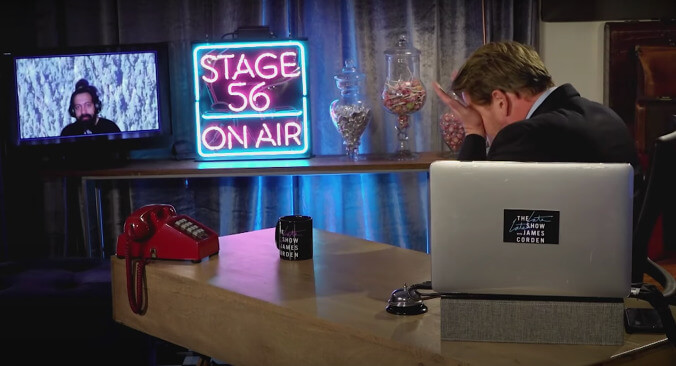White late-night comics wisely turn over their shows to Black experts on racial injustice

The late-night beat becomes less and less about highlighting wacky bits the more the Trump administration fully embraces the worst possible elements of the American character. With the weekend protests against the murder of Black man George Floyd by white Minneapolis police officer Derek Chauvin (and the inaction of three of Chauvin’s police colleagues) erupting into a sustained, nation- and world-wide uprising against systematic racism and oppression, those most reprehensible elements (and people) rose from the mire to meet the moment with predictable but nauseating displays of police brutality, attacks on the free press, and—from the bunker-cowering Trump—outright appeals for authoritarianism and extrajudicial violence from white bigots everywhere.
So, tough room for a comic, and, to their credit, most of the working late-night hosts barely tried for laughs on Monday. With Jimmy Kimmel and only two non-white hosts Lily Singh and Trevor Noah having previously marked Monday off for hiatus, that left Conan O’Brien, Stephen Colbert, Seth Meyers, James Corden, and Jimmy Fallon to stare down their at-home cameras (we’re still in a pandemic, by the way) and engage in what O’Brien exhaustedly termed the “ritual” of “celebrities and comedians” being put in the position of processing tragedy.
Striking a note that carried through to his colleagues airing later in the evening, Conan’s introductory remarks acknowledged how white privilege (and rich privilege, and famous privilege) rendered him wholly inadequate to the task of summing up events stemming from a country’s-worth of racial oppression and violence. Quoting his “favorite writer,” Abraham Lincoln, the noted history buff cited Lincoln’s call for the country to do the work to heal itself after the Civil War almost tore American in half over racial divisions, while noting that, 155 years later, “It is taking too goddamned long.” He then turned things over to CNN’s Van Jones for much of the rest of the show, asking questions and, as he promised, listening more than talking.
Stephen Colbert and Seth Meyers did more traditional monologues, being more traditionally political comedians, although they, too, were more about giving their their invited Black guests—Killer Mike (and, okay, Chris Hayes) for Colbert, SNL’s Michael Che for Meyers—much of the airtime. Colbert made the passionate point in his monologue, “If you deny the human rights and dignity of any people, you will ultimately destroy the society and civilization that you claim to respect.” Meyers similarly encapsulated his point by telling his white viewers that police violence against Black people isn’t a “bad apple” problem, but “ an orchard problem,” calling the institution of American law enforcement, “a predatory system with a history of police misconduct, built on a legacy of racism and exploitation that elevates the comfort and security of white people over the health and safety of Black people.” Meyers also gave time to Late Night writer and all-around ray of light Amber Ruffin to tell the story of her first terrifying and illuminating encounter with a white police officer, and to tell (again, largely white) viewers, “Maybe it’s time to get uncomfortable” if they really want to join the struggle against racism.
Jimmy Fallon kicked off his somber Tonight Show by first addressing the recent controversy (which now seems like it occurred about six months ago) over an old clip of him in blackface as Chris Rock on Saturday Night Live. Fallon was unreservedly apologetic, claiming to be “horrified” at his (and SNL’s) shitty 2000 comedy decision making. After his plan to “start personally and expand out” in matters of racial injustice, he turned the show over to NAACP President Derrick Johnson and CNN’s Don Lemon, deferring rightly that he is the last person (well, not the last) anyone should listen to on issues facing Black Americans. The Roots’ Questlove and Tariq Trotter also passionately introduced an encore performance of their anti-racism protest anthem, “It Ain’t Fair.”
Perhaps the most wrenching moment came on The Late Late Show, where, after his own tearful and helplessness-tinged summation of the nation’s latest police murder of an unarmed Black person, James Corden video chatted with bandleader Reggie Watts. Watts, traditionally the ironic, alt-comic cool customer, got halfway through his thoughts on how he’s been coping with the weekend’s events before suddenly choking up in strangled sobs. “It’s hard,” Reggie managed, pulling himself together while the clearly distraught Corden searched for words of consolation, “There’s so much happening.”
Continuing about his own experiences growing up Black in the Midwest (and revealing to those who don’t know that his cousin is The Color Purple author Alice Walker), Watts tried to explain that he’s spent his life “just trying to be a human being.” Corden then had on Dr. Michael Eric Dyson, and Keegan-Michael Key, and played the stirring Brit Awards performance of “Black” from British rapper Dave, and, as his other white late-night hosts largely did, just listen, explaining, “Because who needs my opinion.”
Looking for ways to advocate for black lives? Check out this list of resources by our sister site Lifehacker for ways to get involved